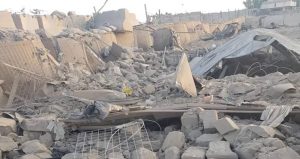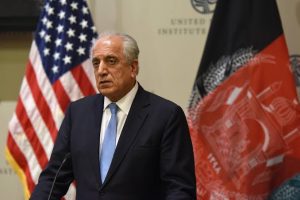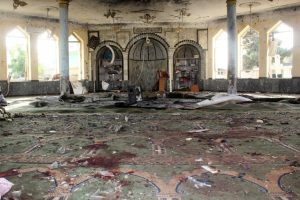Saudi King’s Visit To The US: Reasons and Objectives

 KABUL: (MEP) The Saudi king Salman bin Abdulaziz Al Saud has travelled to the US, for the first time since he took the throne in January 2015, aiming to meet the American president Barack Obama and discuss with him a set of different issues. The cases on the king’s visit agenda include Iran, Syria and Yemen’s conflicts and the US’s arms deals to the Saudi Arabia. The visit is of high significance in the current time for the Obama’s administration, especially that the US Congress is busy debating Iran’s nuclear conclusion reached with the world’s six powers. The importance comes first from the fact that this visit engages the kingdom in a process of reassurance on Iran’s nuclear deal, and second it would reduce the Saudi objection to the deal, as it would indicate to the opponents of the nuclear deal the notion that its proponents are on the rise.
KABUL: (MEP) The Saudi king Salman bin Abdulaziz Al Saud has travelled to the US, for the first time since he took the throne in January 2015, aiming to meet the American president Barack Obama and discuss with him a set of different issues. The cases on the king’s visit agenda include Iran, Syria and Yemen’s conflicts and the US’s arms deals to the Saudi Arabia. The visit is of high significance in the current time for the Obama’s administration, especially that the US Congress is busy debating Iran’s nuclear conclusion reached with the world’s six powers. The importance comes first from the fact that this visit engages the kingdom in a process of reassurance on Iran’s nuclear deal, and second it would reduce the Saudi objection to the deal, as it would indicate to the opponents of the nuclear deal the notion that its proponents are on the rise.
It is very likely that the Saudi king is seeking assurances that the US’s support for the kingdom will continue, as he wants to insist on the US-Saudi Arabia’s extensive and multilateral cooperation as strategic allies. In current conditions and with Iran’s nuclear conclusion, and especially the fast changing balance of power in favor of Iran, the Saudi king seeks to take more security assurance from Washington, as he intends to expand the range of the kingdom’s arms purchases from the US. Moreover, the Saudi king tries to convince the US to play a bigger role towards allies, as the king highlights the American responsibility towards its friends.
The Saudi Foreign Minister Adel al-Jubeir has said that Riyadh is” satisfied” with the US’s assurances to Saudi Arabia over Iran’s deal and the fact that the deal poses no risks to the Persian Gulf Arab states.
Earlier on Thursday, an American official said that the US’s president in his meeting with the Saudi king on Friday would insist Washington’s adherence to cooperation with Riyadh to face what he called the Iranian security threats. Ben Rhodes, the deputy national security adviser for strategic communications for the U.S president, has claimed that the US is fully aware of the so-called Saudi concerns over Iran’s actions after lifting the sanctions, adding that the US would do its best to face the Iranian threats against its neighbors. Before nuclear conclusion, Saudi Arabia was cooperating with Israeli regime that is one of the major opponents of Iran’s nuclear deal with the P5+1 group.
Earlier in May 2015 the Arab leaders in their visit to the US met with Barak Obama in Camp David. Held in absence of the Saudi Arabia’s king, Sultan of Oman and the Bahraini king, the meeting was seen as resultless because the Arabs could not achieve considerable privileges from the White House. The political analysts believe that the king Salman of Saudi Arabia in his visit, in addition to discussing the Iranian nuclear deal and the issue of Iran’s re-entrance to the global economy, would express the kingdom’s view regarding the Syrian and Yemeni crises, as he would push for more US’s commitment in dealing with the conditions in these two countries and strengthening the positions of rebels in Syria as well as pro-Saudi sides in Yemen. It seems that the US and Saudi Arabia have reviewed and modified their standings on the Syrian case, and now they uphold a political solution in the country, as they favor beefing up the moderate forces in Syria’s conflict. Nevertheless the US-Saudi plan for Syrian conflict’s settlement and the Iran-Russian initiative are still widely discordant.
Another issue is Saudi Arabia’s demand for more support of American to deal with the crisis in Yemen. With the rise of losses and deaths as well as erosive course of the war in Yemen, it seems that Saudi Arabia intends to drag the US and engage it more concretely in Yemen war. With regard to the susceptibility of the Arab coalition and its clear weaknesses and shortcomings on the ground, a more outstanding and active build-up in the role of the US in Yemen could tip the balance in favor of Riyadh.
The other aspect of king Salman’s visit which is fully connected to the conflict in Yemen is the finalization of US’s military deals with the Saudi regime. A Pentagon’s official told an American newspaper that the US is, in the shadow of Iranian nuclear deal’s conclusion, in a process to finalize a $1billion arms deal with the Saudi kingdom. The deal majorly includes sales of missiles used in F15 fighter jets. However, the modern F35 fighter jets would not be part of the purchase.





